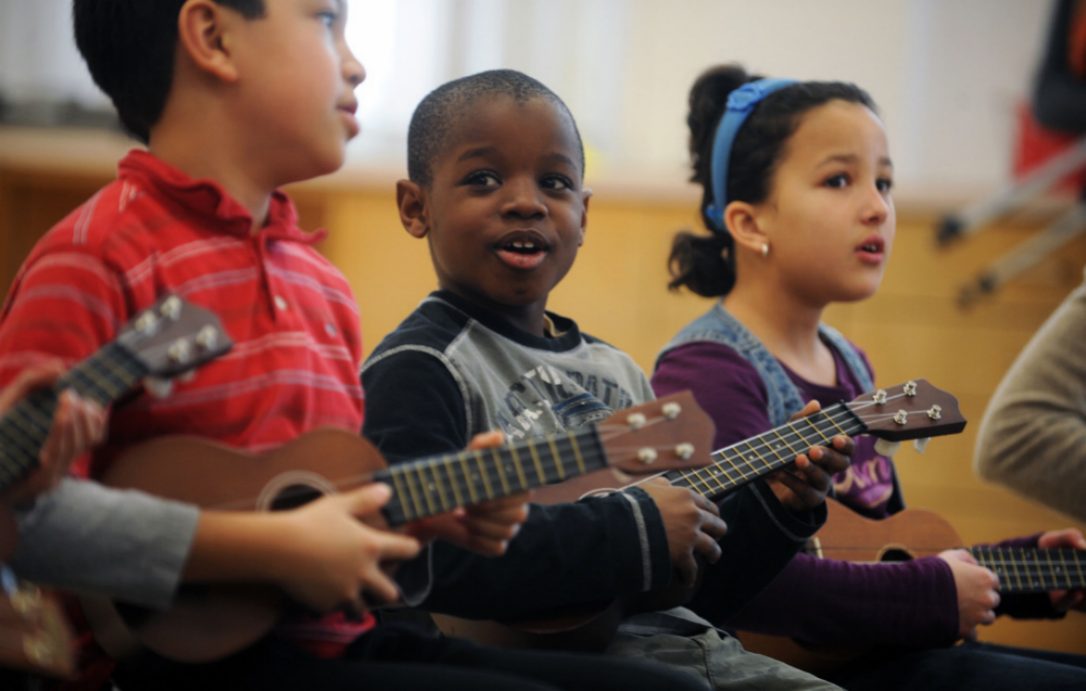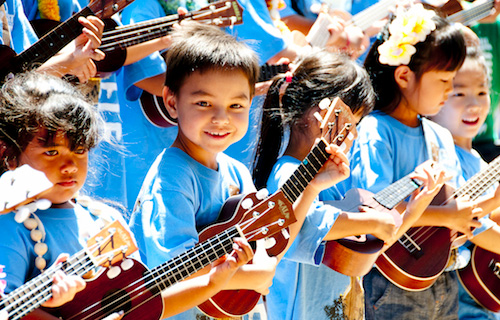That’s about it. When I read it, I was excited because this is just one more study that validates the idea that music lessons not only make you a better musician, but also a better person as a whole. And that may very well be true, but it turns out that this study in particular does not prove it.
The actual study, which isn’t nearly as short as the truncated Ukulele Magazine article, had some underlying issues.
Issue #1: The only kids to show social development were ones with poor social skills to begin with. The other kids showed no improvement because they were already pretty awesome.
Not that I’m against this – any improvement in any person is a good thing and shouldn’t be devalued – but there is a difference between implying everyone became better rather than a select group of people who were deficient in the skills to begin with.
Also, there’s nothing that specifies music as the wonder drug that fixed this. Kids with poor social skills could be put in a room with other kids, told that they have a common goal, and then adjusted their attitudes for a variety of reasons like emulating other kids that they look up to or even the rest of the group imposing social norms and applying enough peer pressure to help mold them into the kid that group needs them to be at that moment rather than let them be the kid that they are naturally.
Issue #2 (and this is the big one): While Ukulele Magazine is focusing on the musical aspect (and why wouldn’t they?), the study was actually using the ukulele as a handy means to an end. The study cites Vygotsky who emphasized doing literally ANYTHING as a group that one child can’t do on their own would probably benefit the child.
The study even says that the same results could probably be accomplished in a drama class.
Basically what is happening here is a group of kids are being corralled together, given a common goal, and taught as a group. The children act as learners, but also teachers because they can know (based on the actions of those around them) if they are doing something wrong, but they can also see when someone else is doing something wrong. They were further told that when they see someone struggling, to help them out.
And I would agree that if you gave a group of kids a 10-month project and taught them how to do it while emphasizing that they help each other out if they see someone falling behind you would end up seeing progress in kids with poor social behaviors. They’re in a safe environment because the teacher or other kids could help them (and at an age when kids aren’t nearly as hostile in their interactions, which really makes me wonder how this study would play out with 16-year-olds) and they’re confined by the goal itself so they can’t exactly wander off.
There are those that may say that even the goal is unnecessary, but I think that’s wrong. If you, say, let the kids loose on a playground for forty minutes a day, five days a week, for ten months, I doubt there would be a change in the kids with poor social skills since they could always slink off to play by themselves.
But group lessons offer the boundaries that the kids can’t leave and they’re basically forced into being helped and then feeling both good and appreciated if they themselves are able to give help to other people. In this setting, the kids are basically peers and there’s no outside sources to cause segregation since it’s just about this one thing. Again, if you think about a playground where a kid could be ostracized based on their favorite show/band/game/etc you could see this wouldn’t increase their social skills. Here, though, even the most socially inept child would feel comfortable helping out someone else if they took to the ukulele faster than someone else and, since everyone grasps instruments at different speeds, this could very well happen. Since the entire class is about JUST the ukulele and nothing else, this is a likely scenario.

Issue #3: They don’t know how long this will last. This was a pretty short study, and that may be an issue. After this, if the kids stay together and continue to go to ukulele class as a group, I imagine things would stay the same. If the kids break off, though, and start learning on their own, I would think that you would sooner see different cliques of ukulele players that happen to be friends outside of class with some rare exceptions.
Look, I think that anything that helps people become better people is something worth pursuing and learning about. And the ukulele has been shown time and again to be an instrument that is exactly what so many people need (it’s affordable, the learning curve is gentle, it’s a friendly-sounding instrument, it’s a pleasant conversation starter, it’s as much an ensemble instrument as it is a solo instrument, etc). Is it a good idea to do group lessons for the ukulele? Absolutely.
But it is just as good of an idea to sign your kid up for shop classes, or drama club, or painting classes. The common theme in the study is to enroll your kid in an activity that they couldn’t do on their own, where the kids learn together and strive to achieve a common goal. THAT’S the magic ticket here and the ukulele, while not the magic bullet that implies guaranteed success like the abbreviated Ukulele Magazine article pushed, is certainly an option to get them to the actual magic bullet that is children working together as a team with as few distractions as possible.


Comments 2
This was an interesting read. As a mother learning to play the uke with my daughter, I love the idea of branching out into bigger groups. Regardless of the studies, I think this would be loads of fun and it’s my new goal, to find other beginners to play with!
As Russ writes, ” The study cites Vygotsky who emphasized doing literally ANYTHING as a group that one child can’t do on their own would probably benefit the child. The study even says that the same results could probably be accomplished in a drama class.”
This makes me wonder if the researchers should have had a control group of a group of kids (or more than one group) doing something together that wasn’t uke-learning. And what if the purpose wasn’t creative or artistic – like learning how to replace a kitchen faucet?
Also, the realist (cynic?) in me keeps remembering that some people in these research fields just publish in order to up their publications credits.
That said, I have not and will not read all of the original article, as it will cut into my nighttime (non-group) uke-playing. G’night.